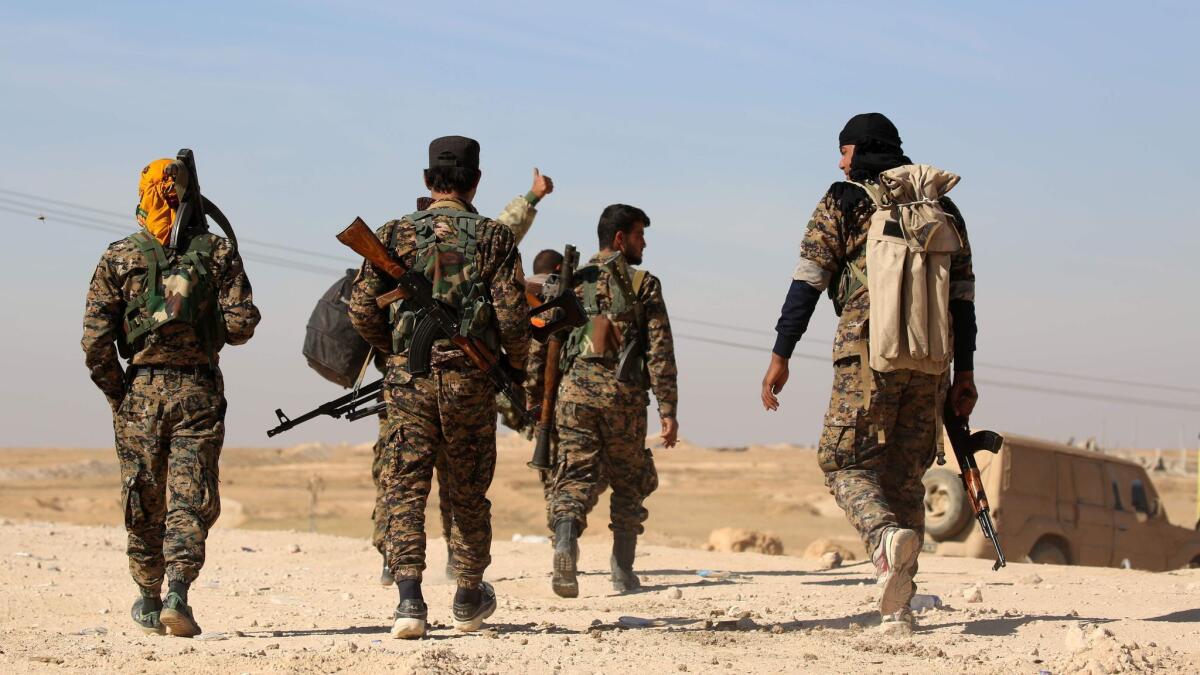The basics of the battle against Islamic State in Raqqah

- Share via
United States-backed Syrian forces began marching last week on the northern city of Raqqah, the de facto capital of the Islamic State group’s self-styled caliphate.
The offensive promises to divert Islamic State fighters from Mosul, the much larger extremist-held city in northern Iraq, which has been the target of a massive operation launched by Baghdad last month. But long-running tensions between Turkey and the Syrian Kurdish-led forces leading the assault on Raqqah could complicate the battle and buy Islamic State more time.
Here is a closer look at what the new offensive means:
Who is leading the offensive?
The Kurdish-dominated Syrian Democratic Forces, or SDF, have emerged as principal players in the country’s multi-sided civil war. They are recognized by the U.S. as one of the most effective fighting forces against Islamic State and have captured large swaths of northeastern Syria from the extremists.
The force is dominated by the Syrian Kurdish group the Democratic Union Party, or PYD, which aims to defend Kurdish areas of Syria. Despite occasional flare-ups, the PYD has had a tacit nonaggression pact with the Syrian government since the start of the civil war and is seen by some rebels as a quiet ally of President Bashar Assad, accusations the PYD denies.
Why might Turkey object?
Turkey views the PYD as an extension of the Kurdish insurgency raging in its southeast, and often speaks of the PYD and Islamic State as similar threats.
Turkish forces and thousands of allied Syrian opposition fighters launched their own offensive in northern Syria this year, clashing with both the PYD and Islamic State. Turkish President Recep Tayyip Erdogan has suggested that his forces and allies should liberate Raqqah, and has also demanded a greater role in Mosul, angering Iraq.
The U.S. wants all of its allies to set aside their grievances, at least temporarily, and focus on Islamic State, but a series of visits by top officials in recent weeks has yielded no major breakthroughs. Turkey has yet to comment publicly on the Raqqah offensive.
How soon until Raqqah is freed from Islamic State?
The Raqqah offensive is likely to take months, and the SDF has said the early stages will focus on sweeping the countryside on its outskirts and gradually isolating the city.
The SDF says it has 30,000 fighters assigned to the campaign, but senior SDF officials have warned progress would be halted if Turkey and its allies advance on other Kurdish-held territory.
If Mosul is any indication, the battle for Raqqah will be a long and grinding one. Nearly four weeks after launching the long-awaited push on Mosul, Iraqi forces have only entered the eastern edge of the city, and have met with stiff resistance in the form of suicide car bombs, rocket attacks and booby-trapped buildings.
Would the loss of Raqqah mean the end of Islamic State?
The loss of Raqqah would deal a major blow to the extremist group.
Raqqah is the seat of power for its self-described caliphate and is probably home to top Islamic State leaders. It is also where the militants are believed to have plotted attacks on Western nations, including last year’s assault on Paris.
But Islamic State has already begun preparing its followers for the potential loss of territory, and if it is driven from Raqqah and Mosul, it will probably return to its insurgent roots. As forces close in on the two cities, many fighters are expected to melt into the civilian population, with some forming so-called sleeper cells that could hatch new attacks.
What about Syria’s civil war?
The war between Assad and the rebels fighting to unseat him is centered on the divided northern city of Aleppo, where Islamic State has no presence.
The government and its ally, Russia, have vowed to launch a new push to retake eastern Aleppo, held by the rebels since 2012. If that succeeds, it would free up thousands of government forces that could be sent to other fronts, perhaps to battle Islamic State.
But since the start of the conflict, Assad and his allies have been more focused on battling Syrian rebels, who are concentrated in the country’s main cities in the west, than the Islamic State group.
That’s unlikely to change, especially if other forces are willing to battle the extremists.
More to Read
Sign up for Essential California
The most important California stories and recommendations in your inbox every morning.
You may occasionally receive promotional content from the Los Angeles Times.













